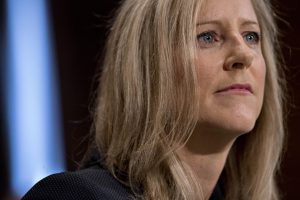 CFPB headquarters in Washington, D.C. (Source: Shutterstock)
CFPB headquarters in Washington, D.C. (Source: Shutterstock)
The CFPB on Thursday rescinded restrictions on when the agency may take enforcement and supervisory actions as a result of abusive acts or practices — eliminating restrictions that had been ordered by the Trump Administration.
"The Bureau has determined that it should exercise the full scope of its supervisory and enforcement authority to identify and remediate abusive acts or practices," the CFPB said in announcing the action.
Recommended For You
Since the new policy is not a rule, it does not have to be open for public comment and will go into effect on the day it is published in the Federal Register.
NAFCU and Republican House members criticized the new policy. The GOP members said it appears the Biden Administration intends to return the CFPB to the strict regulatory regime that existed during the Obama Administration.
In January 2020, then-CFPB Director Kathy Kraninger issued guidance on how the agency would enforce the "abusive" part of Unfair, Deceptive and Abusive Acts or Practices (UDAAP). She said at the time that there was case law and administrative records based on unfair and deceptive acts, but not on abusive acts or practices.
 Kathy Kraninger, former director of the Consumer Financial Protection Bureau (CFPB). Photographer: Andrew Harrer/Bloomberg
Kathy Kraninger, former director of the Consumer Financial Protection Bureau (CFPB). Photographer: Andrew Harrer/Bloomberg At the time, she said the agency would only take action in abusive cases when the harm to the consumer outweighed the benefits. She said the CFPB would avoid challenging conduct as abusive if the agency also was arguing that an act was unfair or deceptive. And she said the CFPB would not seek certain types of monetary relief "where the covered person was making a good-faith effort to comply with the abusiveness standard."
The Biden Administration said Thursday that the 2020 policy statement restricted the CFPB's ability to enforce consumer protection law and was "inconsistent with the Bureau's duty to enforce Congress's standard." It added that "rescinding it will better serve the CFPB's objective to protect consumers from abusive practices."
Instead, the administration said that the agency will, using its discretion, exercise its supervisory and enforcement authority under Dodd-Frank. The agency will take into account a financial services company's size, good faith and other factors in deciding whether to take action, the new policy statement said.
"But a policy of declining to enforce the full scope of Congress's definition of an abusive practice harms both the consumers who were taken advantage of and the honest companies that have to compete against those that violate the law," the new administration said.
NAFCU EVP of Government Affairs and General Counsel Carrie Hunt said the CFPB's decision will create more uncertainty in the financial marketplace.
"The actions by the CFPB today will create regulatory uncertainty on what is considered to be abusive acts or practices," she said. "While the Dodd-Frank Act provides broad definitions of prohibited behaviors under UDAAP, these are not clear rules of the road. Credit unions strongly support consumer protections and consistently work to meet the needs of their members."
House Financial Services ranking Republican Patrick McHenry of North Carolina said the CFPB's decision foreshadows a change in philosophy at the agency.
"The CFPB is already backsliding to overregulation and unaccountability," he said. "Former Director Kraninger worked to provide clarity for businesses and consumers. By undoing this action, the CFPB will be free to abuse this overly broad authority once again."
Rep. Blaine Luetkemeyer (R-Mo.) agreed with McHenry. "Director Kraninger's policy statement gave the CFPB the tools it needed to cultivate compliance and protect consumers from abusive practices," he said. "By eliminating this statement, the Biden Administration appears to be reverting to a time when consumer protections and sound regulation took a backseat to ideological crusades."
© 2025 ALM Global, LLC, All Rights Reserved. Request academic re-use from www.copyright.com. All other uses, submit a request to [email protected]. For more information visit Asset & Logo Licensing.






